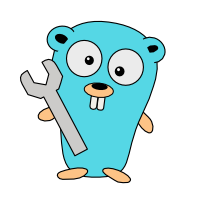Big Things Will Happen
Big things will happen in 2025, for better or for worse. You cannot influence everything and everyone around you, yet you aren't bound to be a mere spectator.
Within your circle of influence, you can move more things than you might think. As a gopher, you can use your software development skills to build software that helps people (including yourself) live a better life. It doesn't matter whether you are working in a large or small company, whether you have been laid off by the big ones, or whether you work through the ups and downs of the freelance IT market. The software you create can make a difference in a lot of ways:
Independence and sovereignty: Centralized services are convenient, but the concentration of power to a few companies can quickly turn favors against their users. Once the users are locked in to a service, the vendor can stop caring about their users and start milking them to the last drop while constantly working on the enshittification of their services. As gophers, we can build software that makes users independent of centralized vendors and sovereigns over their own data.
Resilience and reliability: Software bloat and architectural bloat is avoidable, but it takes effort. We have witnessed languages and software systems grow from lean and easy-to-learn entities to bulky, unwieldy feature behemoths. Over the 15 years of its existence, Go has managed to remain simple and accessible, ideally suited to build robust and maintainable systems.
Efficiency and performance for a greener future: When throughput of SaaS systems hits a limit, the typical reaction is to add more or bigger hardware. Smart companies realized that the real bottleneck was the interpreted language they used. Consequently, they turned to re-implementing their services in compiled, performant languages.
Go particularly stands out here, as it has a great appeal to scripting language users: The insane compile time and the quite accessible type system make Go a low-barrier option for switching to a fast, compiled language. Moreover, Go's straightforward package system is ideal for constructing efficient architectures and getting decent performance out of old and slow hardware (down to microcontrollers, thanks to TinyGo). Less IT garbage, less energy used.
Community and empowerment: A horrible idea: All people in this world would look, think, and act the same. Pluralism is the foundation of developing societies. History has proven this: Whenever two cultures merge peacefully, a new, richer culture emerges. Software, purposefully created, can foster such development. Communities that have built around Go prove that inclusivity is possible and a net positive for everyone: Golang Bridge empowers underrepresented groups in tech, and Women Who Go supports women in a tech world dominated by males.
Sustainable software: Sustainability has many different facets, and gophers are in an optimal position to support all of them: Environmental sustainability through building efficient software; economic sustainability through keeping source code maintainable (easy with Go); social sustainability through keeping up ethical practices, diversity, and inclusion; and techniacal sustainability by writing code that is easy to evolve, adapt, and maintain.
An improved business and life: If you want to make the world a better place, you need to start with your own life. You cannot take care of improving the world if you don't care about yourself. If you're stuck in a rut, if you struggle to make ends meet, if you feel your life is going nowhere, 2005 may be the year of a restart. Your ability to craft beautiful software in Go could be the key to a better life. Improve your life, and you are in the best position to improve others’ lives as well.
What are you waiting for? Use the great tool at your hand to gently push the world where you want to have it. If you haven't made any New Year's resolution yet, how about embracing this goal for 2025 (pun intended):
Go for a better world.
Links:
